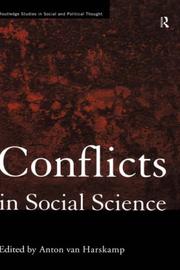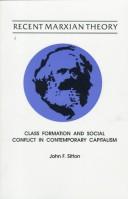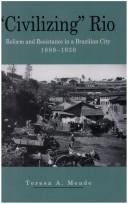| Listing 1 - 5 of 5 |
Sort by
|

ISBN: 1134753179 1280108983 020344101X 0203279875 9780203279878 9780203441015 9786610108985 6610108986 041514826X 9780415148269 0203749251 9781134753178 9781280108983 9781134753123 9781134753161 9781138880924 1134753160 Year: 1996 Publisher: London New York Routledge
Abstract | Keywords | Export | Availability | Bookmark
 Loading...
Loading...Choose an application
- Reference Manager
- EndNote
- RefWorks (Direct export to RefWorks)
This book argues that conflicts in social science must be worked out at the level of the individual discipline rather than at the level of philosophy.
Social sciences --- Social conflict. --- Class conflict --- Class struggle --- Conflict, Social --- Social tensions --- Interpersonal conflict --- Social psychology --- Sociology --- Methodology. --- Sociological theory building
Book
ISBN: 3540612998 3642852637 3642852610 Year: 1996 Publisher: New York ; Berlin ; Barcelona Springer
Abstract | Keywords | Export | Availability | Bookmark
 Loading...
Loading...Choose an application
- Reference Manager
- EndNote
- RefWorks (Direct export to RefWorks)
Social conflict --- Congresses --- Social problems --- Decision making --- Computer simulation --- Reform, Social --- Social reform --- Social welfare --- Social history --- Applied sociology --- Class conflict --- Class struggle --- Conflict, Social --- Social tensions --- Interpersonal conflict --- Social psychology --- Sociology --- Decision making&delete&

ISBN: 0585076502 9780585076508 0791429415 0791429423 9780791429419 9780791429426 1438420218 9781438420219 Year: 1996 Publisher: Albany : State University of New York Press,
Abstract | Keywords | Export | Availability | Bookmark
 Loading...
Loading...Choose an application
- Reference Manager
- EndNote
- RefWorks (Direct export to RefWorks)
Social classes. --- Social conflict. --- Proletariat. --- Capitalism. --- Market economy --- Economics --- Profit --- Capital --- Commons (Social order) --- Working class --- Class conflict --- Class struggle --- Conflict, Social --- Social tensions --- Interpersonal conflict --- Social psychology --- Sociology --- Class distinction --- Classes, Social --- Rank --- Caste --- Estates (Social orders) --- Social status --- Class consciousness --- Classism --- Social stratification

ISBN: 0271072776 9780271072753 027107275X 9780271072777 0271016078 9780271016078 0271016086 9780271016085 027102870X 9780271028705 Year: 1996 Publisher: [United States] Penn State University Press :Made available through hoopla
Abstract | Keywords | Export | Availability | Bookmark
 Loading...
Loading...Choose an application
- Reference Manager
- EndNote
- RefWorks (Direct export to RefWorks)
A massive urban renewal and public-health campaign in the first decades of the nineteenth century transformed Brazil's capital into a showcase of European architecture and public works. The renovation of Rio, or ";civilization"; campaign, as the government called it, widened streets, modernized the port, and improved sanitation, lighting, and public transportation. These changes made life worse, not better, for the majority of the city's residents, however; the laboring poor could no longer afford to live in the downtown, and the public-health plan did not extend to the peripheral areas where they were being forced to move. Their resistance is the focus of Teresa Meade's study.Meade details how Rio grew according to the requirements of international capital, which financed, planned, and oversaw the renewal—and how local movements resisted these powerful, distant forces. She also traces the popular rebellion that continued for more than twenty years after the renovation ended in 1909, illustrating that community protests are the major characteristic of political life in the modern era.
Working class --- Social conflict --- Urban renewal --- Model cities --- Renewal, Urban --- Urban redevelopment --- Urban renewal projects --- City planning --- Land use, Urban --- Urban policy --- Class conflict --- Class struggle --- Conflict, Social --- Social tensions --- Interpersonal conflict --- Social psychology --- Sociology --- Commons (Social order) --- Labor and laboring classes --- Laboring class --- Labouring class --- Working classes --- Social classes --- Labor --- Political activity --- History. --- Employment
Book
ISBN: 2870276044 9782870276044 Year: 1996 Volume: 87 Publisher: Bruxelles : Editions Complexe,
Abstract | Keywords | Export | Availability | Bookmark
 Loading...
Loading...Choose an application
- Reference Manager
- EndNote
- RefWorks (Direct export to RefWorks)
Chronologie --- Geschiedenis van de nieuwste tijden --- Guerres --- Histoire contemporaine --- Oorlogen --- Politiek --- Politique --- World politics --- Social conflict --- Politique mondiale --- Lutte des classes --- History --- Histoire --- -World politics --- -Colonialism --- Global politics --- International politics --- Political history --- Political science --- World history --- Eastern question --- Geopolitics --- International organization --- International relations --- Class conflict --- Class struggle --- Conflict, Social --- Social tensions --- Interpersonal conflict --- Social psychology --- Sociology --- -Social conflict --- -History --- Military history [Modern ] --- 20th century --- World politics - 20th century --- Social conflict - History - 20th century --- Tensions internationales --- Intervention (droit international) --- Gestion des crises --- Relations internationales --- Histoire diplomatique --- Crises --- Histoire universelle --- 20e siècle
| Listing 1 - 5 of 5 |
Sort by
|

 Search
Search Feedback
Feedback About
About Help
Help News
News